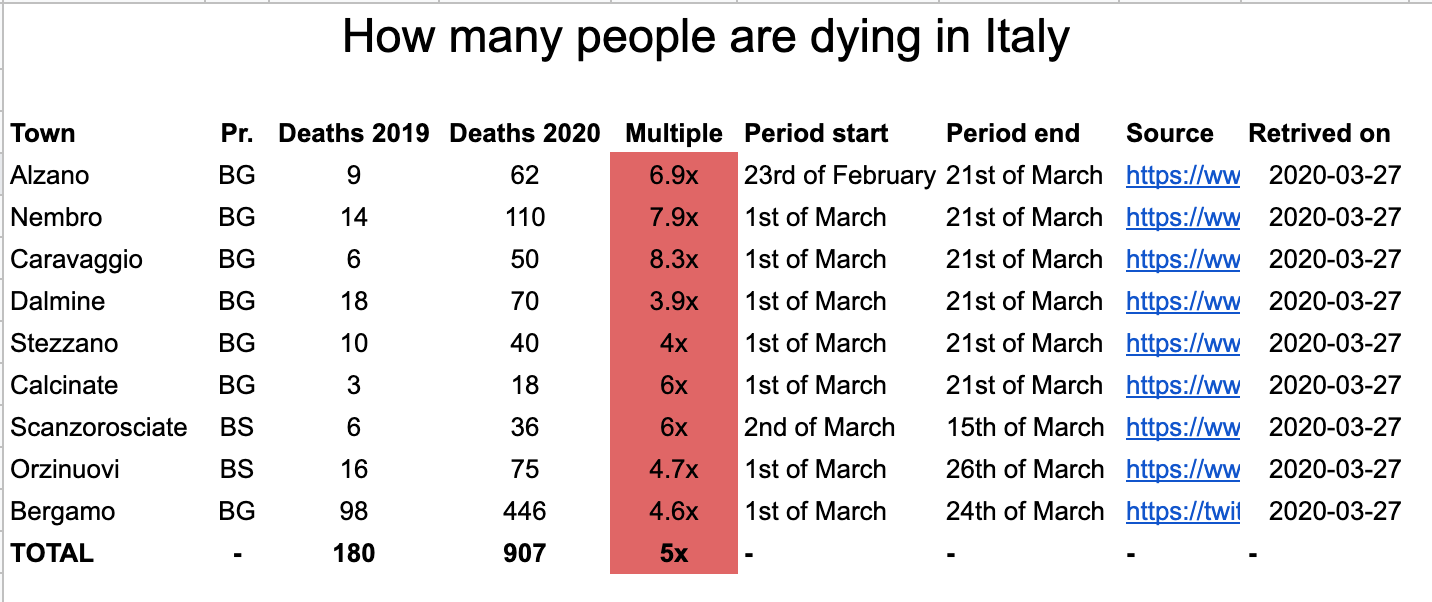The elephant in the room: deaths are undercounted
Evidence that Italy and France have been undercounting deaths and cases
The big elephant in the room of this pandemic is that many countries are undercounting deaths. Below is the evidence.
This is critical because many governments are (unfortunately) calibrating the intensity of their reaction to the number of cases and of deaths in their country.
Update: there is also evidence of undercounting of cases, I recently wrote an essay (link).
Evidence of undercounting in France
The French ministry of health recently ordered nursing homes and similar structures to stop testing residents after 2 coronavirus cases have been confirmed (link 🇫🇷).
Patients in the affected nursing homes with relevant symptoms are assumed infected by the virus and treated accordingly but do not show up in official statistics.
How many deaths are being undercounted?
At least 148 French nursing homes have at least 2 confirmed cases – which means that additional deaths in 148 infected structures full of the most vulnerable people will not surface in official statistics.
To understand that order of magnitude of the under-counting, let’s make a thought experiment. Last night there have been 231 confirmed deaths in France. If, for example, each of the structures saw one additional death yesterday, it would mean that French deaths are undercounted by 39%. (“At least”, because there might be other sources of undercounting.)
Moreover, according to the president of the French Hospitals Federation, “we only know the data provided by hospitals […] the absolute numbers would no doubt be effectively much higher if we aggregated what is happening in retirement homes as well as the people who die at home or who are not counted.” (Reuters, link)
Evidence of undercounting in Italy
Here is a past essay of mine with evidence of undercounting in Italy (link), and here is the most important data point: in Bergamo, people are dying at 4.5 times the rate of a normal year. In the 1st-24th of March period, 446 deaths in 2020 vs 98 in the same period in 2019.
The essay contains other data points regarding the cities I managed to find the data online: in total, 6 towns in Northern Italy registered a total of 731 deaths over the last ~3 weeks compared to 148 over the same period last year: 4.3 times as much!

Counting the total number of deaths regardless of cause and comparing it to a similar period of time in the past years is the most robust way I can think of for estimating the true extent of the excess mortality caused by the virus, directly (causing its hosts to die) or indirectly (by saturating our healthcare system and disrupting our economy).
Update, 2020-04-01: the largest study of Bergamo province so far finds out that:
5400 people died this March
4500 of which suspected COVID deaths
2060 of which officially COVID
Compared to 900 deaths only, average of last 3 years (sampling cities representing >50% of local population)
Source: link (in Italian, requires free registration to read).
Update, 2020-04-10: Anedoctal data reveals that many tests are not performed or requested. For example, near Torino, Piedmont, there is this nursing home in which 27 out of 111 guests recently died. 12 out of 12 tested resulted positive for COVID. The other 15 hadn't been tested, but showed "strong symptoms" (link). These deaths will not show in official statistics. A few kilometers away, 21 more dead in another nursing home. 11 of which in single a weekend. Out of 87 beds. With one healthcare worker who tested positive. NO TEST HAS BEEN REQUESTED FOR ANY OF THE DEAD GUEST (link). Yes, it’s anedoctal data, but there is a mountain of similar anedoctal data out there. Enough to claim that not enough tests are made, not where it matters.
Evidence of undercounting in Spain
This article (link, in Spanish, ht @mimasde).
Also, according to Spanish coffin makers, demand soared 10x (link, in Spanish).
Undertesting
As the outbreak progresses, number of tests begins to diverge from number of people tested. This is because the hospitalized need to be tested multiple time to confirm recovery. More on this in my article on “the testing illusion” (link).
Why are countries undercounting their own deaths?
In some cases, it might be a deliberate effort to deceive or to avoid panic.
In other cases, it could be incompetence, lack of test kits, a population who is scared of visiting hospitals (potential places of infection), or many other operational reasons.
Either way, under-counting cases and deaths is dangerous, for it provides a false sense of security which might lead to failing to adequately respond to the virus.
What it means for researchers
Any researchers who embarks in making forecasts regarding the coronavirus should at least consider the possibility that official data might be under-counting reality.
This is not a school exercise in which provided data can be assumed true (ludic fallacy). In the real world, validating data or considering its uncertainty is part of the exercise.
Providing data or conclusion (even with a disclaimer) that assume that data is representative of reality without further indication is a dangerous disservice, for our policymakers might read such reports and underestimate the threat posed by the pandemic, with the final result of a potentially lethal under-reaction.
What it means for my readers
First, when you read official numbers, consider that they might be a lower bound, unless proven otherwise. Take the necessary precautions, for you, your family and your employees, even if the number of cases in your city seems not to warrant it yet.
Second, if you have evidence of undercounting in your city or country, please email it to me (luca-dellanna.com/contact). Thank you!
About me: I’m Luca Dellanna, the author of 5 books.
Sign-up to this newsletter using the button below.

Additional remarks:
Of course, like some of my readers remarked, it could be that the COVID-19 “pulls forward in time” a few deaths of people in bad health who would have died soon anyway, with the result that the first months following the resolution of the pandemic might see lower deaths than usual – but aren’t those hours and days important? Shouldn’t we strive to make sure that our grandparents die when their time has come but not a minute earlier?




L'elefante nella stanza sono le persone come te, che si definiscono "studiosi", ma sono incapaci di ammettere di aver avuto torto marcio.
Siccome starai facendo i salti mortali per evitare di vedere ciò che è sotto gli occhi di tutti ti lascio un po' di materiale con cui aggiornarti sullo stato delle cose: buona lettura!
https://thekylebecker.substack.com/p/the-collapse-of-the-state-approved
https://stevekirsch.substack.com/p/new-paper-an-estimated-13-million
Salvation,
According to your article, I wanted to know if this explained the figure of 34 days for a covid incubation in 2020 put forward by some pre-publication?
Cordially